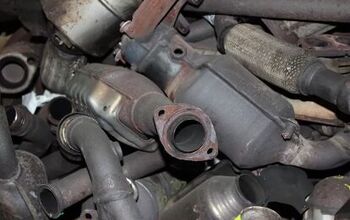UAW: What's So Funny About Peace, Love And Understanding?
Earlier this week, newly-elected UAW President Bob King gave a speech before the Center For Automotive Research Conference, touting the deep changes that have transformed the union. The first half of King’s speech sounded a much-needed note of contrition, and highlighted the new spirit of cooperation between the UAW and Detroit’s management class. But a number of observers noted that the second half of King’s speech represents the flip side of the UAW’s new sense of responsibility for the fate of Detroit: a commitment to targeting the transplant factories that have made life hell for the union and the Detroit automakers alike. After all, nothing brings enemies together like a common adversary. But the UAW’s enemy isn’t just South of the Mason-Dixon line… it’s lurking within its own confused body politic.
Of course, some are happy to simply see the new UAW-Detroit alliance simply as peace and love breaking out all over. Indeed, Michigan Governor Jennifer Granholm even broke out an old Detroit chestnut in order to describe the UAW’s transformation in as glowing terms as possible [via The Freep].
I think that’s a national story, that this is not your father’s UAW. I mean, it’s really the old mind-set being adversarial, the new mind-set being partnership, that we’re going to be competitive together in the global economy
But the transition to a “21st Century UAW” working in partnership with the Detroit automakers needn’t be explained as a sign of maturity in the union’s new leadership. After all, the UAW’s VEBA account owns a majority stake in Chrysler and a significant stake in GM as well. Keeping Detroit competitive has always been in the union’s interest, but since the bailout, this reality has become a lot more difficult to ignore. The problem is that the union’s stake in GM and Chrysler makes its leadership less responsive to the needs of its members. Which is why the second half of King’s speech takes aim at the transplants.
King’s short reign as the head of the UAW has already been characterized by a sharp uptick in the union’s old-school, left-internationalist rhetoric… for several good reasons. First, two-tier wages, the NUMMI closure, and the end of pattern bargaining have left an already-weakened UAW more vulnerable to internal division than ever before. By talking up a worker’s crusade against the evil transplants, King can gloss over the very real inequities within the UAW, protect its “investment” in Detroit by disrupting its competitors, and give the UAW a much-needed image makeover. And what political leader would turn down an opportunity to do “God’s work” while protecting his own venal interests?
This contradictory posture is apparent in King’s proposal of “UAW Principles for Fair Union Elections.” With national support for the union-backed “Employee Free Choice Act” flagging, King is proposing UAW-defined standards that he explains will
include requirements such as equal access to the employees for both union and management and prohibition of making derogatory, insulting or untruthful statements about the other party. The UAW principles ban any threats or pressure by either the union or management.
We will soon be unveiling these principles, and we will present them to the executives within the industry who are not currently unionized. We will ask them to sign on to these principles. If a company agrees to adopt the UAW Principles, and then abides by these principles, we will respect the decision of their workers whether they vote to join the union or not.
However, if companies do not agree to these principles, and instead engage in threatening behavior towards workers who want to organize a union, or fire workers who try to organize, or close down facilities to thwart union activity, then the UAW will not tolerate the violation of workers’ First Amendment rights…
Let me be clear, our goal is not to force auto companies to unionize. This is not about our institutional self-interest; it is not about getting dues money. It is about democracy, and goes to our fundamental mission and the reason for our existence: to protect the right of workers to organize unions and collectively bargain for fairness, dignity, and a democratic voice.
Of course it is about institutional self-interest. And it’s absolutely not about the First Amendment. As Paul Kersey of the Mackinac Center For Public Policy points out
These guidelines will prohibit “derogatory, insulting, or untruthful” statements. King declined to say whether or not the guidelines will allow employers to call attention to the UAW’s role in bankrupting two out of three domestic carmakers.
Whose First Amendment rights appear most at risk from the UAW’s proposed guidelines, the workers’ or the transplant managements’? After all, the main reason for workers to oppose UAW organization is the last 40 years or so of the union’s history. If that can’t be brought up due to its “derogatory” nature, are workers’ best interests really being looked after?
And as Automotive News [sub]’s James Treece notes,
inside that olive branch was a stick. If the vote is not fair and unfettered, King warned — if management issues threats or intimidates workers who ask for a vote; if disparaging attacks sully the election — we’ll come after you with every weapon we have. He didn’t quite promise to burn down management’s house, but he didn’t rule it out, either.
And what’s most funny about the UAW’s new peace, love and understanding offensive, is that (internal union struggles aside), the UAW is still the greatest threat to the recovery of the Detroit automakers. Ford is already being hit with unequal treatment from the union, and conflicts over Delphi VEBA contributions, buyouts, local plant decisions and more are souring the UAW’s united front with even the automakers it partially owns.
Behind all the talk of a 21st Century union, cooperation with Detroit, and the UAW’s civilizing mission, lies the same blindered self-interest we’ve come to expect from the UAW. And there’s nothing funny about that.
More by Edward Niedermeyer
Latest Car Reviews
Read moreLatest Product Reviews
Read moreRecent Comments
- Alan My view is there are good vehicles from most manufacturers that are worth looking at second hand.I can tell you I don't recommend anything from the Chrysler/Jeep/Fiat/etc gene pool. Toyotas are overly expensive second hand for what they offer, but they seem to be reliable enough.I have a friend who swears by secondhand Subarus and so far he seems to not have had too many issue.As Lou stated many utes, pickups and real SUVs (4x4) seem quite good.
- 28-Cars-Later So is there some kind of undiagnosed disease where every rando thinks their POS is actually valuable?83K miles Ok.new valve cover gasket.Eh, it happens with age. spark plugsOkay, we probably had to be kewl and put in aftermarket iridium plugs, because EVO.new catalytic converterUh, yeah that's bad at 80Kish. Auto tranny failing. From the ad: the SST fails in one of the following ways:Clutch slip has turned into; multiple codes being thrown, shifting a gear or 2 in manual mode (2-3 or 2-4), and limp mode.Codes include: P2733 P2809 P183D P1871Ok that's really bad. So between this and the cat it suggests to me someone jacked up the car real good hooning it, because EVO, and since its not a Toyota it doesn't respond well to hard abuse over time.$20,000, what? Pesos? Zimbabwe Dollars?Try $2,000 USD pal. You're fracked dude, park it in da hood and leave the keys in it.BONUS: Comment in the ad: GLWS but I highly doubt you get any action on this car what so ever at that price with the SST on its way out. That trans can be $10k + to repair.
- 28-Cars-Later Actually Honda seems to have a brilliant mid to long term strategy which I can sum up in one word: tariffs.-BEV sales wane in the US, however they will sell in Europe (and sales will probably increase in Canada depending on how their government proceeds). -The EU Politburo and Canada concluded a trade treaty in 2017, and as of 2024 99% of all tariffs have been eliminated.-Trump in 2018 threatened a 25% tariff on European imported cars in the US and such rhetoric would likely come again should there be an actual election. -By building in Canada, product can still be sold in the US tariff free though USMCA/NAFTA II but it should allow Honda tariff free access to European markets.-However if the product were built in Marysville it could end up subject to tit-for-tat tariff depending on which junta is running the US in 2025. -Profitability on BEV has already been a variable to put it mildly, but to take on a 25% tariff to all of your product effectively shuts you out of that market.
- Lou_BC Actuality a very reasonable question.
- Lou_BC Peak rocket esthetic in those taillights (last photo)

































Comments
Join the conversation
SSDD. The same old union stuff. Do what we say or we will beat the %$@!#& out of you. No wonder they have just about vanished from the non-government portion of the economy.
For starters I don't condone how the UAW(CAW)operates, if there is to be a change, the members themselves should change it, instead of being led by a large Boss! I was President of a Canadian Union Local not CAW and I learned there is a right way and a wrong way to keep the members happy and willing to grow and move on, in the UAW(CAW)they run each local from the Top down, whereas in my old Union we ran everything from the ground up, there is a difference and Yes Unions are not Communist, Socialism is not Communist, please try and understand it. Good Unions operate all over the World in peace and harmony for the betterment of all the members, there are a small minority that give Unions a bad name, such is life! Peace.